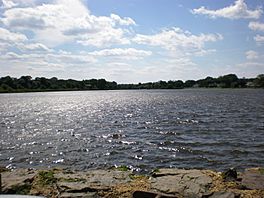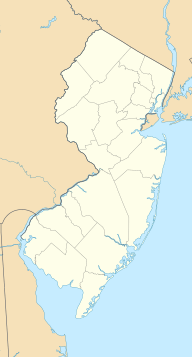Wreck Pond facts for kids
Quick facts for kids Wreck Pond |
|
|---|---|

Wreck Pond in Spring Lake, New Jersey
|
|
| Location | Monmouth County, New Jersey |
| Coordinates | 40°08′26″N 74°02′04″W / 40.140532°N 74.034355°W |
| Type | Coastal lake |
| Primary inflows | Wreck Pond Brook, Hurleys Pond Brook, Hannabrand Brook |
| Basin countries | United States |
| Surface area | 73 acres (30 ha) |
Wreck Pond is a freshwater pond located right by the Atlantic Ocean in Monmouth County, New Jersey. It's a special kind of pond called a tidal pond. This means its water level changes with the ocean's tides. The pond is surrounded by several towns: Wall Township, Spring Lake, Spring Lake Heights, and Sea Girt.
The pond got its interesting name because of sailors long ago. At night, when it was dark, sailors sometimes confused Wreck Pond with the Manasquan Inlet, which is another opening to the ocean further south. This confusion could lead to shipwrecks. To help prevent this, the Sea Girt Lighthouse was built. Eventually, the original connection between the pond and the ocean was filled in, which stopped the problem.
Contents
What is the Wreck Pond Watershed?
Wreck Pond is at the center of something called the Wreck Pond Watershed. A watershed is an area of land where all the water drains into a common body of water, like a pond or river. This watershed covers about 12 square miles (31 km2) in eastern Monmouth County.
How Water Flows into Wreck Pond
The main streams that feed water into Wreck Pond are Wreck Pond Brook, Hurleys Pond Brook, and Hannabrand Brook. Other smaller bodies of water in this watershed include Hurleys Pond, Osbornes Pond, Albert Pond, and Old Mill Pond.
For a while, Wreck Pond emptied into the Atlantic Ocean through a special pipe. This pipe helped control how much ocean water flowed in and out. However, after a big storm called Hurricane Sandy, the ocean naturally created a new opening to the pond. In 2016, a larger pipe with gates was built to help manage the water flow even better.
Why Wreck Pond is Important for Fish
The lower parts of Wreck Pond are very important for certain types of fish. These fish are called anadromous fish. This means they live in the ocean but travel to freshwater, like Wreck Pond, to lay their eggs. One example of such a fish is the alewife herring.
Protecting the Land Around Wreck Pond
Some of the land around Wreck Pond is owned by the public. This land is protected, meaning it cannot be built on. Other areas are considered freshwater wetlands. Wetlands are special areas of land that are covered by water, either all the time or for part of the year. They are protected by laws in New Jersey and the United States. These laws help keep the wetlands safe from development.
Challenges Wreck Pond Faces
Over the years, Wreck Pond has become shallower. This is because dirt and sand, called sediments, are carried into the pond by streams and from storm water runoff. Storm water runoff is water from rain or melting snow that flows over the ground.
Understanding Pollution in Wreck Pond
This buildup of sediment, along with increased storm water, has also led to a problem with pollution. The pond sometimes has high levels of something called fecal coliform bacteria. When a lot of water flows into the pond from storms, it can push this polluted water out into the Atlantic Ocean. This often causes beaches in nearby towns like Sea Girt and Spring Lake to close.
Scientists have studied where this pollution comes from. A study by Professor John Tiedemann from Monmouth University found that the main source of these bacteria is human waste. This waste can get into the water from old sewer pipes, septic systems that aren't working right, or illegal connections to the sewer system. Experts are working on ideas to help local towns fix these problems.
Efforts to Clean Up Wreck Pond
The New Jersey Department of Environmental Protection has helped fund projects to clean up Wreck Pond. They have partially removed some of the built-up sediment from the pond. They also extended the storm water runoff pipe further into the ocean. Even with these efforts, sometimes the water from the pipe still washes up on local beaches. Because of this, Monmouth County has a rule: if it rains a quarter of an inch or more, the beaches are automatically closed.
A group of local people, environmental helpers, and government officials work together to protect Wreck Pond. They are called the Wreck Pond Watershed Preservation Association. They meet often to talk about ways to keep the area healthy and clean.
 | Percy Lavon Julian |
 | Katherine Johnson |
 | George Washington Carver |
 | Annie Easley |



